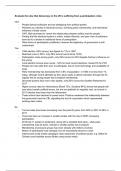Evaluate the view that democracy in the UK is suffering from a participation crisis.
Intro
- People distrust politicians and are dealigning from political parties
- Presents as a decline in electoral turnout, shrinking party membership, and diminished
influence of trade unions
- 1997, Blair promised to ‘renew the relationship between politics and the people’
- Feeling that the electoral system is unfair, media influence, and poor view of politicians
have led to a decline in traditional forms of participation
- Other forms of participation proliferate, however the legitimacy of government is still
undermined
Yes
- 1950 election, 85% turnout, but dipped to 71% in 1997
- Reached a low in 2001, only 58% turnout (worst since 1918)
- Participation crisis among youth, only 56% turnout in 2019 despite Corbyn’s influence on
the young
- Local election turnout even worse - 33% for local council elections, lowest 8% for PCC
- People are more able than ever to participate, due to more technology and availability of
news
- Party membership has decreased from 3.8% of population in 1983 to to less than 1%
today, although recent attempts by the Labour party to attract members through the £3
registry fee for young people has increased membership
- Devolved powers face more voter apathy, only 50% turnout for Scottish Parliament in
2017
- Higher turnout rates for referendums (Brexit 72%, Scotland 84%) shows that people still
care about certain political issues, but are too apathetic to regularly vote, as turnout in
2017 election was lower than the referendum
- Trade unions have declined in power since Thatcher weakened the relationship between
the government and the CBI, signalling the end of corporatism which represented
working class voters
No
- Turnout rates have been increasing over the past 20 years, from 58% in 2001 to 69% in
2017
- There has been an increase in smaller parties with the rise of UKIP increasing
participation
- 2019 had 11 parties in parliament, along with a sizeable third party - while party
membership may be down, interest in smaller parties has increased
- Membership of pressure groups has risen sharply with millions involved
- Nature of participation has changed, but not necessarily become a crisis
- Internet and social media campaigns raise awareness of political issues, e.g. Strike for
Climate could mobilise across Britain using social media
, - Online petitions have increased the reach of political issues, hundreds of thousands of
people have access to petitions, makes it more likely it reaches the 100,000 requirement
to be debated in parliament
Outcomes
- Lower turnout means less legitimacy in government
- Only 26% of registered voters voted for the 1997 Labour government, meaning only 26%
of voters gave the government mandate for the Iraq War
- Low turnout means the country is not accurately represented, or can skew
representation (e.g. 18-24 turnout rate 56% compared to 70+ 85% in 2017)
- Lower party membership means a smaller pool of people to run for office, and a party
that is not as representative of its voter base as before
- Focus on online political activism leads to ‘slacktivism’ or people limiting their political
engagement to online, which does not hold elected governments accountable
- Newer forms of engagement such as online petitions and protests have no direct and
guaranteed effect on governance, as the numerous anti-COVID measure
demonstrations proved
- Declining power of trade unions means less accountability for the government from
organisations working to advocate for the working class
Conclusion
- Participation has changed, but it is not equal to high voter turnouts of the mid-20th
century
- Lower turnout and political participation means that governments are not held to
account, people are less educated about political matters, and government is less
representative
- Increasing turnout shows hope for the future, but an overreliance on social media and
degradation of politicians threatens this
Evaluate the case for introducing proportional representation for UK general elections.
Intro
- Jenkins Commission
- 1997 attempts at reforms
- Aside from PR, there are many mixed forms of voting system that work more effectively
Proportional Representation
- Directly translates number of votes to number of seats
- Can be found in some devolved bodies, with proportional closed lists used in part of
Scottish Parliament
- Gets rid of constituency links
- Does not lead to strong governments, would likely always be coalitions, although
Germany manages with this




